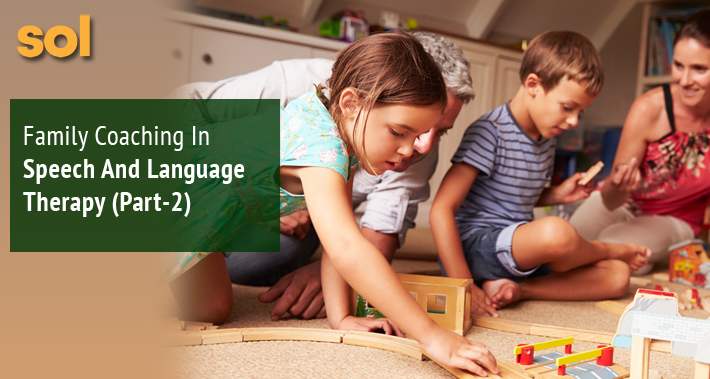
In continuing our discussion of family coaching in early intervention, it’s important to understand the principles behind early intervention and what we aim to get out of each session.
Key Principles
Infants and toddlers learn best through everyday experiences and interactions with familiar people in familiar contexts.
This is why early intervention sessions are held either in the child’s home or in the child’s daycare/school.
We aim to provide services in the least restrictive environment.
During the era of COVID-19, this is most likely the home, via tele practice.
We believe all families, with the necessary supports and resources, can enhance their children’s learning and development.
Speech and language pathologists at Sol want to empower families, to ensure they feel comfortable enough to incorporate strategies and resources provided to them, even with the therapist is not around.
Which brings us to our next principle… the primary role of a speech language pathologist in early intervention is to work with and support family members and caregivers in children’s lives.
The early intervention process, from initial contact through the end of therapy, is dynamic and individualized to reflect the child’s and family members’ preferences, learning styles and cultural beliefs.
Sol recognizes that every family is different and requires varying levels of support and engagement.
We take a family-centered approach to early intervention speech therapy.
And last, but certainly not least…evidence-based practice at Sol is always a top priority.
Our speech-language pathologists working with young children and family members must provide intervention based on explicit principles, validated practices, best available research, and relevant laws and regulations.
With these principles in mind, along with a better understanding of what our goals are within early intervention, with families and clients, it’s best next, to take a look at the characteristics of a great session and thorough session.
Characteristics of Great Coaching
First up: Observation
The therapist observes the caregiver within the context of his/her everyday activities.
Then, the caregiver observes the therapist model a behavior or activity in the context of an everyday activity with an explicit understanding of what and why he or she is watching.
Next: Action
The therapist supports the caregiver in practicing, refining, and/or analyzing new or existing skills during real-life situations (i.e., meal time, bath time, dressing, play, etc.) that occur during and between sessions.
The caregiver tries new ideas or actions that either were previously discussed and planned with the therapist (i.e., providing two choices for food during snack time) or resulted from a previous conversation.
Then: Reflection
The therapist uses reflective questions to assist the caregiver in analyzing the current situation, and then encourages the caregiver to generate alternatives and actions for continually improving his/her knowledge and skills, thereby achieving desired outcomes, such as having the child express himself using words.
The caregiver and therapist determine what worked or did not work and why it did or did not and takes time to generate ideas for next steps.
For example, a parent might say they modeled a word for each object and asked the child to say it, numerous times.
The therapist then might advise the parent to try only 2-3 times before moving on, to decrease frustration for the child.
Second to last: Feedback
During this step, the therapist acknowledges when it is appropriate to affirm what the caregiver says or does.
A therapist will provide helpful feedback when necessary and will share information to build up the caregiver’s knowledge and skills.
Finally: Joint Planning
The therapist will likely begin every session by reviewing the previous joint plan and asking some, if not all, of the following questions:
- What strategies/skills have your tried since our last session?
- How did it go?
- What would you like to work on today?
- At end of the session: What would you like to work on between sessions this week?
It’s important to remember, when providing any sort of caregiver or family coaching, to offer support.
At the end of the day, we want families to walk away feeling supported, understood and empowered.
We want families to be able to move out of a 30-60 minute long session, and use the knowledge, strategies, and skills we’ve provided them throughout their daily routines.
Sol Speech and Language Therapy aims to incorporate all of these practices into our early intervention and regular speech and language therapy sessions.
If you’d like more information on therapy sessions or would like to consult with a licensed therapist at Sol, please feel free to book an appointment.
6448 E Hwy 290 Suite E-108,
Austin, TX 78723
(512) 368-9488
» https://g.page/r/CfRfhOpEQm7BEAE
Sol Speech & Language Therapy
555 Round Rock W Dr E-221,
Round Rock, TX 78681
(512) 808-3953
» https://g.page/r/Cb5pwCTosSEfEBM
Sol Speech & Language Therapy offers personalized skilled intervention to those struggling with their speech and language skills. Services offered include screening, consultation, and comprehensive evaluation. We also provide one-on-one and/or group therapy for speech sound disorders, receptive/expressive language delay/disorder, stuttering/cluttering, accent reduction, and much more.